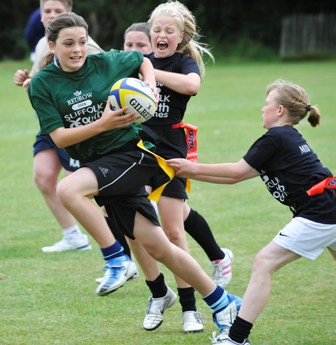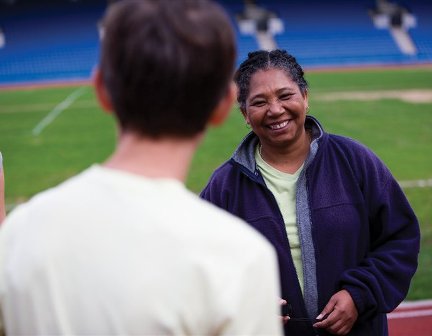
Community-based sports development: still supported by national partners?
Community sports development services: a new vision for delivery
The development and delivery of sport is likely to be at the top of the media agenda over the next three years but there are some who question whether we have a sports system that will bear scrutiny. Stephen De-Wint offers a new model of a coherent, focused structure that could build capacity, make the most of resources and deliver a real impact.

Community-based sports development: still supported by national partners?
After fifteen years working in sports development with local authorities, universities, county sports partnerships and district council sports development teams I have come to change my views on the future for community-based sports development. This is a personal perspective of how sports development services could be delivered in a joined-up fashion, providing capacity-building services at a fraction of the current cost, while freeing resources to help solve some of the more long-term issues that face the sector.
In practice community sports development now incorporates a whole range of services: sports administration, event management, facility development, club, coach and volunteer development, play development, school-sport links, and health and physical activity delivery. This grassroots work is increasingly under threat in a number of ways: from impending government cuts; overstretching of services; a disjoin between the Sport England strategy (primarily supporting national governing bodies of sport) and the local agenda; pressure from the London 2012 Olympic Games; and a general lack of understanding from key decision-makers, sports people and potential sports participants of the services we provide.
The current government has been clear that cuts will be made wherever it is felt possible or desirable and I do not believe that community-based sports development has the support from national partners in the way that it used to, nor from local authority leaders, except where the service provides some locally desired, disparate delivery function. There are other assumptions one can make. Dedicated district sport and leisure functions are not particularly well-resourced and likely further cuts will continue this erosion of key personnel. In many parts of the country people and agencies working directly in community sport and leisure tend, in the main, to be responsive rather than strategic. The sector is disparate and the contracting-out of facilities management has led to a degree of separation between facility management and sports development functions. As a result of recent health investment some local authorities are more focused on increasing levels of physical activity than on the development of sport per se,.
After much soul searching, I feel – somewhat sadly – that we are at the point where community sports development needs to clarify its mission, standardise as many services as it can (that elusive golden thread we have been talking about for years) and look at ways of delivery that do not require large numbers of generalist staff providing too many bespoke services. I envisage a world where properly delivered sports development services could still contribute towards outcomes such as: education, by reducing the skills gap, having an impact on achievement and standards and providing alternative learning opportunities; health improvement through lifestyle improvements; community cohesion via place-shaping, developing community vibrancy and increasing volunteering; and economic development through helping with job creation, assisting tourism development and ensuring that staff are “fit4work”.
I believe that achieving these outcomes in economically hard times requires a definite move towards capacity-building services that use the power of sport to ensure that local people are being provided with the tools, skills and resources to continue development work in the absence of paid staff. This is not the outreach programmes and initiatives that we have been encouraged to deliver over the past few years but a definitive attempt to maximise our key resource: the dedicated sports participant who can do so much to recruit, retain and support others in their sporting endeavours if they are provided with the right tools.
I have often heard it said that we are still dealing with the same issues, just under a different initiative name. At the start of the Active Sports programme (1999/2000) one of the biggest operational issues was the tracking of children between different platforms of delivery and in particular between school and clubs. Ten years later we still seem unable as a country to be able to measure the +3 hours within the ‘5 Hour offer’. We need some clear thinking and innovation to solve these types of issues but if we are to think creatively we need the time and resources to do it properly. That means we need to standardise and integrate the services we already know how to deliver. At present we deliver a disparate service to members of a public who do not understand what we offer, yet who take up so much time and resource that we do not have the time nor innovative processes in place to move us beyond our current cycles of work.
Community Sports Development could be more efficiently delivered through a number of delivery channels if it was a standard service offering. My ‘starter for ten’ is based on the principle that we should be building capacity across the sports community. It would be achieved by ensuring that sports development provided as a core the following:
My aim here is to promote discussion and debate about how to sustain vitally important capacity-creating services in an area of activity which will be at the top of the media agenda for the next three years. I hope it will provoke some in the industry to say that we need to grasp the nettle and focus on providing a service that has a standard core and that is appreciated by members of the public. It is these people who vote for politicians and eventually pay for services, be they public or commercial. It is through high-quality, capacity-building services that we will build a stronger sports network across England that will, we hope, continue to use its paid development staff in constructive ways. Sports development has the ability to bring people together in a way that no other public service can provide – it encompasses fun, education, structure, personal development, healthy activity and support to our economy – but if we are to see real sustainable benefits we need to have a clear vision and focus, some standardisation at our core, and the time and inclination to solve bigger problems than we have dealt with until now through innovation and creativity.
Stephen De-Wint is the former chief executive of the Lincolnshire Sports Partnership
The Leisure Review, August 2010
© Copyright of all material on this site is retained by The Leisure Review or the individual contributors where stated. Contact The Leisure Review for details.
Download a pdf version of this article for printing
